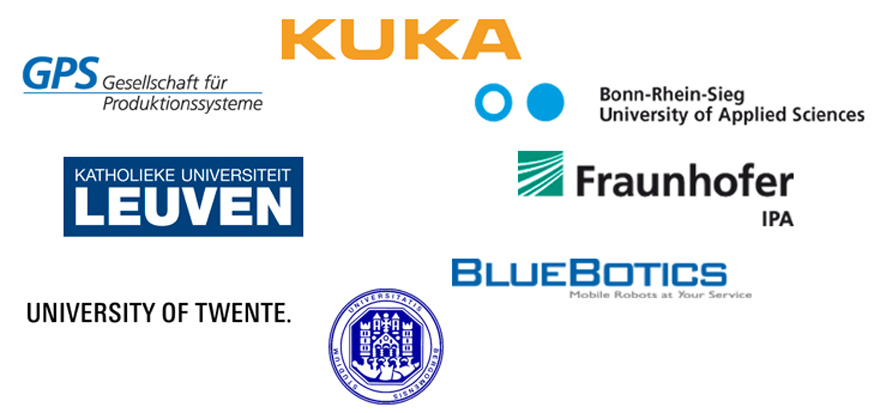Consortium

KUKA Laboratories GmbH (Augsburg, Germany) is a subsidiary of KUKA AG and is a globally establishes service robotics company. Its core competencies are the development and distribution of robots for medical, assembly and service robotics. The company has close research and development co-operations with leading research institutes and universities all over the world. KUKA Laboratories GmbH currently has approximately 80 employees.
Areas of expertise: Service Robotics, Medical Robotics, Assembly Automation
GPS Gesellschaft für Produktionssysteme GmbH (Stuttgart, Germany) was founded in 1999 as a German spin-off by the Fraunhofer Institute of Manufacturing and Automation (FhG-IPA). The GPS two main activities include (1) system and product development in the field of service robotics and (2) project management and technology transfer and marketing. Competencies are focused on the support of R&D projects in the scope of information and automation technology. This support covers all project phases, from advisory assistance during the planning of a research and development project (e.g. for contents-related planning and initiation of a project) to day-to-day project management and operational support of the project coordinator and giving advice and support in exploiting the results. GPS is experienced in conducting large scale, multi-partner scientific projects in the field of robotics.
The Bonn-Rhein-Sieg University of Applied Science, BRSU (St. Augustin, Germany) is a young German university with more than 5000 students distributed over three campuses in Sankt Augustin, Rheinbach and Hennef, all located in the vicinity of Bonn. The university employs more than 120 professors, an equal number of scientific staff, and over 280 associate lecturers from industry and cooperating research facilities. A steadily increasing and versatile curriculum comprises 15 different programs in economics and business administration, computer science, electrical and mechanical engineering, and applied natural sciences. In 2002, BRSU established an International Master Program on Autonomous Systems (MAS) with about 60 students from all over the world currently enrolled in the program. The program has a strong focus on robotics, systems design and engineering, including topics such as system architecture, middleware, integration frameworks, learning, planning, and reasoning.
The BRICS project group at BRSU is coordinated by Prof. Gerhard K. Kraetzschmar and currently includes four Ph.D. students and one MAS student.
The Katholieke Universiteit Leuven (Leuven, Belgium)is a general university, with about 35.000 students. The Mechanical Engineering Department counts about 200 students, with a staff of about 30 professors, five of whom are active in the domain of robotics; that domain has an average of 15 PhD students during the last decade.
Fraunhofer Institute for Manufacturing Engineering and Automation IPA (Stuttgart, Germany) develops solutions for organisational and technological functions in the production sector of industrial companies form the main areas of research and development work. The institute also addresses issues resulting from developments and changes in the service sector. The activities conducted by the Robotic Systems department encompass all the subject areas connected with robot deployment and automatable production processes, as well as the development of robotic systems and their key components. A wide range of development tools, laboratories and testing facilities are available for development projects, trials and demonstrations. IPA has been a forerunner in service robotics in Germany both with respect to market studies, system and component developments and showcasing cutting edge technology in this field.
Founded in 1961 the University of Twente, UT (Enschede, The Netherlands) is an entrepreneurial research university with special focus on technological developments in the knowledge society. With about 2700 employees of which 950 are active in research and 8000 students it is, together with TU Delft and TU Eindhoven, part of the 3TU Federation that advocates the establishment of a single Federation of Dutch Technical Universities in 2010. The research in the Control Engineering (CE) laboratory of the faculty of Electrical Engineering, Mathematics and Computer Science (EWI) is embedded in the Institute of Mechanics Processes And Control Twente (IMPACT) and the Centre for Telecommunication and Information Technology (CTIT). Both are interdisciplinary spearhead institutes of UT. IMPACT focuses on optimisation of products, processes and methods, improvement of sustainability and minimisation of environmental imprints of processes and products. The CTIT focuses on design and application of advanced telematics and information technology systems, and their integration into user environments.
Università degli Studi di Bergamo (Bergamo, Italy) was founded in 1968. The University currently has 6 Schools (Facoltà), 13,000 students, and about 300 professors at the full, associate and assistant level. The Computer Engineering (Ingegneria Informatica) program was activated in 2002 by the School of Engineering and since then has managed on average more than 100 new enrolments per year. Since the decision was made to activate the Computer Engineering program, the University recruited 15 professors within the field of Information and Communication Technology. The Dipartimento di Ingegneria dell´Informazione e Metodi Matematici organises research activities in the field of Information and Communication Technology. In 2002 the University has established the Software for Experimental Robotics Laboratory (SERL) that carries on research activities focused on the definition and experimentation of Software Engineering techniques and methodologies that support the development of robotic software systems. SERL participates in the formation of engineers of the Computer Science area by means of lectures and hands-on experiences related to robot programming, robot simulation, micro−controller network protocols design, computer vision, mechatronics, and real−time systems.
BlueBotics SA (Lausanne, Switzerland) is a Swiss SME located in Lausanne with the mission to enable the mobility of vehicles for the automation in the professional use market. The company started with the Shrimp outdoor platform and with the production and exploitation of eleven RoboX (tour-guide robots) at Expo.02 − Swiss National Exhibition in Neuchatel. Today, the company works on two segments: ANT®, an innovative navigation solution for the transportation of goods and in−house services and R&D Service Robotics, the company can offer complete professional solutions or enhance current products with its technologies.